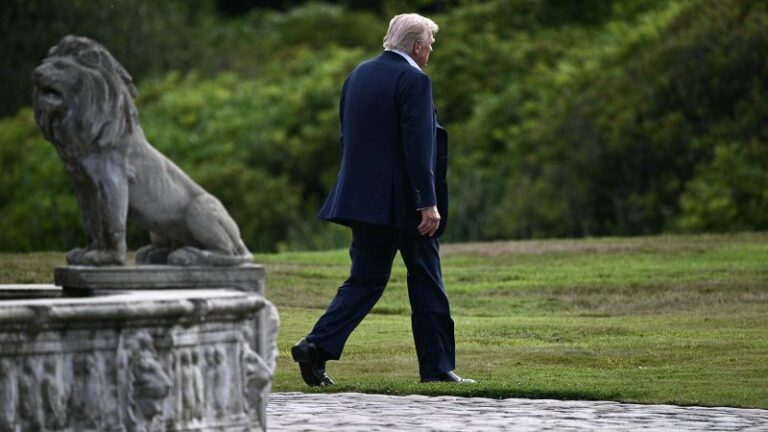A version of this story appeared in CNN Business’ Nightcap newsletter. To get it in your inbox, sign up for free here.
Not long ago, American conservative orthodoxy held that when it comes to doing business, the government that governs least governs best.
The orthodoxy manifested itself in familiar ways. Groups that claimed the mantle of individual liberties would decry new legislation. Talk radio and podcasts would mock unnamed bureaucrats for ham-fisted overreach. And powerful business lobbies were quick to denounce — in press releases and even lawsuits — regulations or taxes they saw as government overreach.
But when faced with President Donald Trump’s efforts to seize control of private enterprise — such as his recent arrangement to have the US pocket a portion of Nvidia’s sales to China, his social media outbursts at individual executives, his moves to take a stake in Intel, and his use of executive powers to cajole banks and law firms he perceives as insufficiently loyal — those same groups have gone quiet.
Take the US Chamber of Commerce, the largest business advocacy group in the country.
Last year, the Chamber sued a federal consumer watchdog group for attempting to cap credit card late fees at $8 a month, claiming the agency “exceeded its statutory authority.” In 2023, it sued the Biden administration over provisions for Medicare price negotiations in the Inflation Reduction Act, claiming the move would consolidate “unfettered and unchecked power” to the department of Health and Human Services.
But under Trump’s second term, the Chamber has had little to say publicly about Trump’s aggressive meddling in the private sector.
Similarly, the Business Roundtable, another DC-based lobbying group that represents hundreds of chief executives, has rarely been shy about denouncing what it sees as presidential overreach in the form of taxes and environmental regulations. This year, though, the group has been largely MIA on the MAGA shift toward a style of capitalism that more closely resembles the autocratic regimes of Russia and China.
Both groups have criticized Trump’s trade war, warning that tariffs hurt American businesses. But neither has spoken out about the president’s more direct assault on free enterprise.
Neither the Chamber of Commerce nor the Business Roundtable responded to multiple requests for comment.
The president, a self-styled dealmaker, has thrown out the standard free-market playbook in ways that have alarmed lawmakers, investors and legal experts. And suddenly, the legal protections businesses have long counted on appear shaky, said Philip M. Nichols, a professor of legal studies and business ethics at the University of Pennsylvania’s Wharton School.
“Any business that sticks its head up, or any business person that sticks their head up, is taking a risk that can’t be calculated,” Nichols said in an interview. “What’s the smart thing to do — what do the wildebeest do when they get to the crocodile-infected river? They wait for the other wildebeest to jump in, and then follow.”
Several trade groups have privately drafted plans to push back against the Trump administration in defense of their business interests, people familiar with the matter told CNN. But those plans were shelved at the request of members that are worried about drawing White House ire.
“There’s an ‘Eye of Sauron’ element here that everyone is very aware of,” one manufacturing CEO told CNN, referring to the “Lord of the Rings” character that brought all subjects to heel. “But there’s also a recognition that this is an administration that is transactional if they believe you’re on board with their agenda.”
When it comes to exerting his influence over Corporate America, no matter appears too small or too large for Trump’s input.
Last month, the president took credit for Coca-Cola’s decision to roll out a cane-sugar-sweetened product that aligns with his allies’ “Make America Healthy Again” philosophy. He regularly criticizes CEOs in public for perceived slights, demanded that Intel’s boss resign over unspecified conflicts, and urged Goldman Sachs to fire its top economist after the bank said tariffs would raise consumer prices (a fact virtually all economists agree to be true, and which we are now seeing borne out in reality).
While much of that bluster is run-of-the-mill Trump rhetoric, the president shocked trade experts when he announced an unorthodox (and potentially illegal) arrangement with chipmakers Nvidia and AMD earlier this month. In exchange for export licenses that allow them to sell their products in China, the companies agreed to funnel 15% of their China sales to the US government — a setup that some analysts called a “shakedown” of private enterprise.
The White House’s push into private businesses took another turn Tuesday when officials confirmed the administration was considering using taxpayer money to acquire a stake in struggling chipmaker Intel. The primary reason for such a move, Commerce Secretary Howard Lutnick said, was the president’s desire to reduce US dependence on Taiwan for chip production. But he also said Trump believes the government should have “equity” in tech giants.
The silence from Corporate America to Trump’s incursion into private businesses isn’t entirely unexpected. Businesses have lost their appetite for the kind of socially progressive rhetoric many adopted in response to the 2020 murder of George Floyd. At the same time, Trump’s return to the White House came with a cost-benefit analysis for any business leaders thinking of speaking out: Make yourself a target, or fall in line and wait for the massive tax cuts the president has promised.
“Corporate citizens are harmed just like flesh and blood citizens are harmed when you have a leader who… actively seeks to monetize public office and actively seeks to use the power of the presidency to harm perceived enemies or anyone who doesn’t appropriately capitulate,” Donald Sherman, executive director of the Center for Responsibility and Ethics in Washington, told CNN. “In some ways, this is the natural and predictable result of failing to appropriately stand up to President Trump’s anti-democratic and authoritarian tendencies during his first term.”
